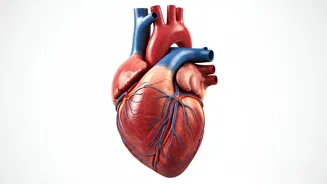The Gender Disparity
Cardiologist Dr. Dmitry Yaranov has brought to light a significant misconception regarding heart disease. It's commonly believed that heart disease is a predominantly
male concern, but Dr. Yaranov is actively dispelling this notion, bringing awareness to the fact that women often face a higher risk. In his view, it is very essential to recognize that heart attacks can be deadlier for women. Women can experience different symptoms compared to men. Many times, this results in delayed diagnosis and treatment, impacting outcomes. Thus, it is critical for women to be informed about the warning signs, which helps in seeking timely medical attention, saving lives. This shift in understanding is vital for promoting better cardiovascular health outcomes and improving the focus on gender-specific health requirements. Therefore, it is essential to understand the varied impact of heart disease on both men and women.
Post-Menopause Risks
One of the key aspects highlighted by Dr. Yaranov is the heightened risk women face after menopause. The decline in estrogen levels during this period drastically affects cardiovascular health. Estrogen plays a crucial role in protecting the heart by keeping blood vessels flexible. As estrogen diminishes, women become more susceptible to cholesterol buildup in arteries, which increases the risk of heart attacks and strokes. This emphasizes the need for women to proactively monitor their heart health during and after menopause. This includes regular check-ups, lifestyle adjustments, and being vigilant about potential symptoms. Dr. Yaranov's insights highlight the importance of preventative measures such as a balanced diet, regular exercise, and managing stress. It helps in addressing this increased risk.
Detecting Heart Disease
The challenge of detecting heart disease is compounded by the fact that symptoms in women can differ from those in men. While men often experience the typical chest pain, women may present with atypical symptoms such as nausea, fatigue, and shortness of breath. These symptoms are often misdiagnosed or dismissed, leading to a delay in seeking necessary medical care. Education about these varied manifestations is crucial. Promoting awareness of these signs can empower women to recognize potential problems and seek prompt medical intervention. Early detection of heart disease is critical for effective treatment and improved outcomes. It frequently involves several diagnostic methods, including electrocardiograms, stress tests, and angiograms, which aid in evaluating heart function. In emphasizing these detection challenges, Dr. Yaranov underlines the significance of comprehensive assessment in diagnosing heart disease in women.
Preventative Measures
Prevention plays a crucial role in improving heart health, and Dr. Yaranov stresses that adopting a proactive approach is vital. It involves lifestyle adjustments like maintaining a balanced diet low in saturated and trans fats. Regular physical activity is essential, with recommendations including at least 150 minutes of moderate-intensity exercise per week. Regular health checkups are equally important. Early detection allows for interventions like medication and lifestyle changes to prevent the progression of heart disease. This comprehensive strategy is not merely about avoiding heart attacks, but about enhancing overall well-being. It emphasizes the role of an active partnership with healthcare professionals in managing and monitoring health. Dr. Yaranov's insights underscore that prevention should be the first line of defense against heart disease, helping to lead to a longer and healthier life.
Heart Attack Treatments
Dr. Yaranov highlights the various treatment strategies for heart attacks. The cornerstone of immediate intervention is restoring blood flow to the heart muscle. This is often achieved through procedures like angioplasty, which involves opening blocked arteries, or the use of medications. Additional treatment options include medications to control blood pressure, lower cholesterol levels, and prevent blood clots. Cardiac rehabilitation programs, which involve supervised exercise and education, are also vital for recovery and improving heart function. The availability of treatments, such as timely intervention, significantly affects outcomes. Dr. Yaranov emphasizes that rapid access to medical care is crucial in a heart attack. It is crucial to be aware that effective treatments are available and that promptly seeking medical assistance is a vital step in saving lives and minimizing heart damage.
Heart Attack Fatalities
The alarming prevalence of heart attack fatalities underscores the urgency of addressing this health issue. Dr. Yaranov’s insights point out that the rate of heart attack fatalities varies between men and women. Factors such as delayed diagnosis, and different symptoms contribute to this disparity. These statistics highlight the need for enhanced awareness and early intervention strategies. It helps in promoting education and training on the signs of heart attacks. The ultimate goal is to reduce the mortality rate. By understanding the different outcomes, healthcare professionals can tailor treatment strategies and improve patient outcomes. Dr. Yaranov’s emphasis on this issue serves as a call to action to enhance efforts in reducing heart attack-related deaths and ensuring every patient gets the best possible care.
Emotional Health Impact
Heart disease and emotional health are deeply interconnected, a point that Dr. Yaranov emphasizes. Conditions like stress, depression, and anxiety can affect cardiovascular health. Emotional distress can lead to unhealthy lifestyle choices, such as poor diet and lack of physical activity, and can directly affect heart function by raising blood pressure and increasing the release of stress hormones. Managing emotional health is a vital component of preventing and recovering from heart disease. Stress-reduction techniques, such as mindfulness and meditation, are very beneficial. Seeking professional mental health support, including therapy or counseling, is also important. The integration of mental and physical well-being is key in creating a holistic approach to heart health. Dr. Yaranov underscores that prioritizing emotional well-being helps improve overall outcomes.
8 Life-Saving Facts
Dr. Yaranov provides eight critical facts. Firstly, heart attacks are deadlier for women, which highlights the importance of gender-specific education. Secondly, understanding different symptoms in women is crucial for timely intervention. Thirdly, post-menopausal women face heightened risks, requiring proactive health monitoring. Fourthly, prevention through lifestyle changes like diet and exercise is essential. Fifthly, regular health check-ups are crucial. Sixthly, rapid medical attention is key during a heart attack. Seventhly, emotional health plays a significant role in cardiac wellness. Lastly, the need for continuous education on heart health is vital for everyone. These key points sum up that awareness, early detection, and prompt treatment are vital to reduce the impact of heart disease. It underlines the need for a comprehensive approach to heart health, combining medical care with lifestyle changes.


















